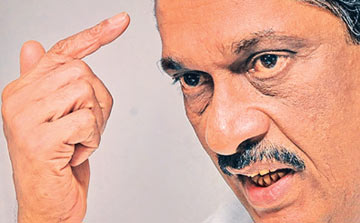|
Fonseka continues to sail stormy waters:
The unexplained visa denial
by Ranil Wijayapala
On Friday, December 18, Field Marshal Sarath Fonseka, the highest
ranking military personality in Sri Lanka, a politician who has been at
the receiving end of the political system since his entry into
mainstream politics, turned 65 years.
 |
|
Sarath Fonseka |
As he turned 65, he had some new worries to contend with. Fonseka, it
is well documented, has had enough worries to handle since his entry
into national politics, perhaps far grave and personally hurtful,
compared with his long years of military service.
This time around, it was not his security which was at stake but a
thorny issue that prevented him from travelling to the United States.
The delayed visa for his planned tour in the United States has made him
uncomfortable and led to serious concerns being expressed about the US
stance on the former Army chief who led the forces to military success,
crushing the Liberation Tigers of Tamil Eelam.
It was obvious, according to a spokesman for Field Marshal Sarath
Fonseka, that the delay in issuing his visa was due to the US Embassy in
Colombo being not in a position to process his visa application. Fonseka
is a holder of a US Green Card but in this instance, it has lapsed and
he could not apply for his visa on time.
The ‘Green Card’ is an acknowledgement of US citizenship and allows
individuals to live and work in the US on a permanent basis. It is an
informal term for a US Permanent Resident Card.
Procedure
“As he is a holder of a Green Card, his visa application cannot be
processed here at the American Embassy in Colombo but has to be
processed by the US State Department itself. According to the embassy
officials, that takes time,” a spokesman for Field Marshal Fonseka said.
Under these circumstances, Field Marshal Fonseka had to abandon or
delay his planned tour to the US to be with his children who are living
in the US and his intention to spend his 65th birthday with his
children. In addition, he has also planned to attend some events
organised by the Sri Lanka Embassy in the US, as reported in the media.
The US Embassy in Colombo has remained tight-lipped on the issue and
when contacted, the US Embassy in Colombo refused to comment, saying it
was a matter for Washington because of Fonseka’s status as a US
resident.
This silence led to many questions and speculations. It was quickly
linked to alleged war crime charges and Fonseka’s previous role in
leading the military in defeating the LTTE.
There were other reasons. Some prominent ambassadors representing the
European nations - a bloc that spearheaded war crime charges against Sri
Lanka - opted not to attend the ceremony in which the war-winning former
Army commander was reinstated as a General and thereafter decorated with
the rank of Field Marshal.
Their decision, though not officially declared, reflect that they are
not going to recognise military personnel who had links in the final
stages of the conflict with the LTTE.
When Sarath Fonseka made his last visit to the US as the Chief of
Defence Staff in 2009, he was having differences of opinion with the
Rajapaksa regime. He had been questioned by the US immigration officials
on the final stages of the war and on the alleged war crime charges and
thus compelling former President Mahinda Rajapaksa and Defence Secretary
Gotabhaya Rajapaksa to make special arrangements to fly him back to the
country, cutting short his US tour.
Since then, he has had no opportunity to visit the US due to the
political turmoil he had to face in Sri Lanka and his serving a jail
term, subsequent to the 2010 January Presidential Election.
This is the first attempt he has made to enter the US after being
acquitted from all trumped up charges against him, by the former regime.
War crimes link
According to green card visa regulations of the US, a green card visa
holder has to spend one month in the US every year to ensure the
continuity of the visa and failure to do so will result in automatic
lapse of the visa. Though his green card had lapsed, his wife, Anoma
Fonseka, under extremely difficult circumstances had fulfilled the visa
obligations, visiting their daughters living in the US.
Green card visa applicants are required to state whether they were
ever under arrest or convicted of a crime.
If a person has any crime or conviction in his or her record, it
immediately raises the issue of admissibility to the US. Due to this,
the processing of his visa was expected to take time, despite the fact
that he was acquitted.
The US State Department, analysts say, should have taken into
consideration that he is still the island’s topmost military personality
who has also publicly announced his willingness to present himself
before any court to record his version on the final stages of the war.
To that extent, there is compliance with the call for independent
inquiries into alleged war crimes.
On the other hand, when Fonseka was victimised repeatedly by the
Rajapaksa regime due to his defection, the US Government was, in fact,
opposed to such victimisation.
But one thing remains obvious; For Sarath Fonseka, despite a public
commitment to demonstrate accountability and face any war crimes
inquiry, he is destined to sail in the stormy waters internationally.
|


